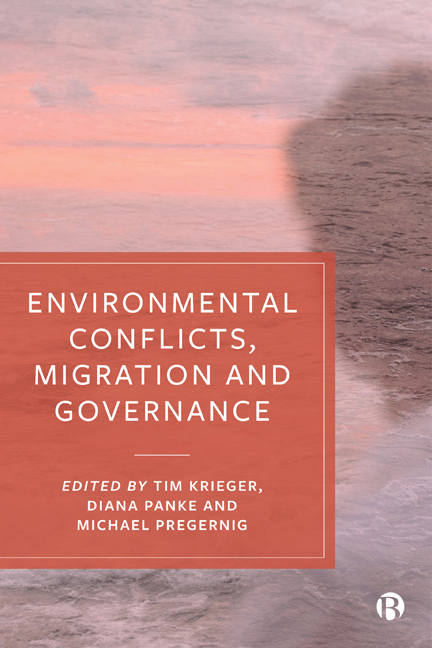Book contents
- Frontmatter
- Contents
- List of Figures and Tables
- List of Acronyms
- Notes on Contributors
- Acknowledgements
- 1 Environmental and Resource-Related Conflicts, Migration and Governance
- 2 Renewable Resource Scarcity, Conflicts and Migration
- 3 Extractive Resources, Conflicts and Migration
- 4 Climate Change, Conflicts and Migration
- 5 The Individual Level: Selection Effects
- 6 The Individual Level: Sorting Effects
- 7 Migration Governance at the State Level: Policy Developments and Effects
- 8 Environmental Migration Governance at the Regional Level
- 9 Migration Governance at the Global Level: Intergovernmental Organizations and Environmental Change-Induced Migration
- 10 The Link between Forced Migration and Conflict
- 11 Conflict-Prone Minerals, Forced Migration and Norm Dynamics in the Kimberley Process and ICGLR
- 12 On the Nexus Between Environmental Conflict, Migration and Governance: Concluding Remarks
- Index
10 - The Link between Forced Migration and Conflict
- Frontmatter
- Contents
- List of Figures and Tables
- List of Acronyms
- Notes on Contributors
- Acknowledgements
- 1 Environmental and Resource-Related Conflicts, Migration and Governance
- 2 Renewable Resource Scarcity, Conflicts and Migration
- 3 Extractive Resources, Conflicts and Migration
- 4 Climate Change, Conflicts and Migration
- 5 The Individual Level: Selection Effects
- 6 The Individual Level: Sorting Effects
- 7 Migration Governance at the State Level: Policy Developments and Effects
- 8 Environmental Migration Governance at the Regional Level
- 9 Migration Governance at the Global Level: Intergovernmental Organizations and Environmental Change-Induced Migration
- 10 The Link between Forced Migration and Conflict
- 11 Conflict-Prone Minerals, Forced Migration and Norm Dynamics in the Kimberley Process and ICGLR
- 12 On the Nexus Between Environmental Conflict, Migration and Governance: Concluding Remarks
- Index
Summary
Introduction
Ethiopia suffers from considerable deforestation in almost all areas around refugee camps, as the people living there, sometimes for protracted periods over several decades, rely on firewood for cooking. This has increased insecurity for both the refugees and the local population (Salih, 1999; Bacchi, 2017). Clashes between refugees and the local population over natural resources, particularly firewood, leading to several deaths and many injured people, were reported in neighbouring southern Sudan, where the locals consequently demanded the closure of refugee camps, and similar confrontations have occurred in Nepal (Doki, 2017; IRIN, 2017). Countries all over the world are thus sceptical about forced migration, as in these examples. Owing to security concerns, many states are reluctant to accept refugees without reservations. Yet how can refugees affect the security situation and conflict dynamics of a host country? A better understanding of the link between refugees, conflict and security is necessary to prevent potential protection gaps regarding both the host population and refugees.
This chapter therefore addresses the following question: how does forced migration affect conflict dynamics in host countries? This is answered from a political science perspective. Many countries debate limitations for refugees and migrants for fear of environmental degradation, economic pressures and increased insecurity. Also, the academic literature has identified refugee movements as a factor contributing to the regional clustering of civil war. Case-based evidence suggests that refugees may increase ecological and economic resource scarcity (see Chapter 2), induce pressures on public health, disturb the demographic balance in the host country, or diffuse rebel networks and import weapons, thereby triggering instability.
For example, despite continuing insecurity in Syria and a halted peace process, several refugee-hosting countries, including in Europe and neighbouring countries of Syria, push for the return of Syrian refugees. Lebanon's army forcefully has closed camps (Bolliger, 2017). According to one survey, more than half of the Lebanese population fear that the Syrian refugees threaten the fragile national security and stability in Lebanon or challenge the employment market (Bolliger, 2013). Similarly, the several hundred thousand refugees from Sierra Leone and Liberia hosted by Guinea in 2000 and living in camp settlements close to the border suffered cross-border attacks. The Guinean government blamed the refugees for these attacks and accused them of collaborating with rebel groups.
- Type
- Chapter
- Information
- Environmental Conflicts, Migration and Governance , pp. 177 - 196Publisher: Bristol University PressPrint publication year: 2020



